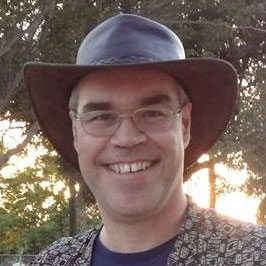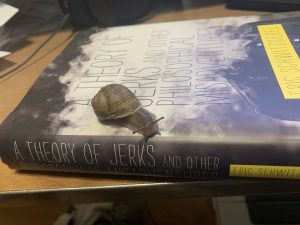Eric Schwitzgebel
 Department: Philosophy
Department: Philosophy
Rank: Professor
# of years at UCR: 23 (~44% of my life)
Top three texts I would take to a desert island: The collected Borges, Montaigne, and Zhuangzi. See my Five Books interview on the philosophers of wonder!
Favorite activity: Long walks in beautiful places. Or maybe, during a lecture, the well-crafted pause — that silent moment when the attention of the audience slowly gathers.
Something people might be amazed to know about me: I doubt that anything about me would be amazing to most people. So instead, I will share a picture of my new pet garden snail named Mermaid (image below).
An “adventure” I am looking forward to, post-pandemic: Visiting England and Scotland with my family.
My blog: The Splintered Mind
Q: My research agenda summed up in one sentence:
Something very weird must be true about how human consciousness is related to the rest of the universe, but we’re not in a good position to know where exactly the truth lies among the various weird possibilities.
Q: A good portion of your recent work links philosophy and science fiction. Do your various projects have a similar or common aim?
Broadly speaking, my projects aim to lay out the various possible theories of the mind’s place in the cosmos. I aim to show that every viable theory of mind and cosmos is both bizarre and dubious. Sometimes these bizarre and dubious possibilities are best understood by way of philosophical argument. At other times, they are best understood by means of speculative empirical science or thoughtful science fiction.
Q: My current project…
…will hopefully convince you that the world is even weirder than you thought.
Q: What started you on this research path?
(1.) thinking about how scientific and philosophical theories of consciousness would or wouldn’t apply to hypothetical aliens, artificial intelligence systems, and group minds and (2.) thinking about puzzles in cosmology concerning multiverse theory, the consequences of infinitude, and simulation theory.

Eric’s pet garden snail, Mermaid, exploring his most recent book.
Q: When folks ask you what you love about your work, what do you say?
I tell them… about garden snail sex. Garden snails are some weird alien creatures right here in our gardens, and scientific and philosophical theories of the mind struggle to make sense of them.
Q: If you could change something about the structure of the university, what would it be?
I’d reduce the bureaucratic burdens on faculty and staff, especially concerning grant applications and grant expenditures. We should spend our time on the core missions of researching and teaching, rather than spending so much time requesting money.
Q: Do you have a favorite resource you like to recommend?
The TV series Black Mirror is doing some of the best thinking right now on the ethics of technology.
Q: What have you learned from teaching and mentoring students over the years?
I have learned to meet people where they are and show how what you want to teach them connects through to what they were already interested in.
Q: What tried and true teaching practice have you found also works well online?
Regular check-ins with your advisees. These are easy to do online and more important in this time when some students are feeling out of touch with campus life.
***
In Focus is a interview series that features faculty associates of the Center for Ideas and Society.
